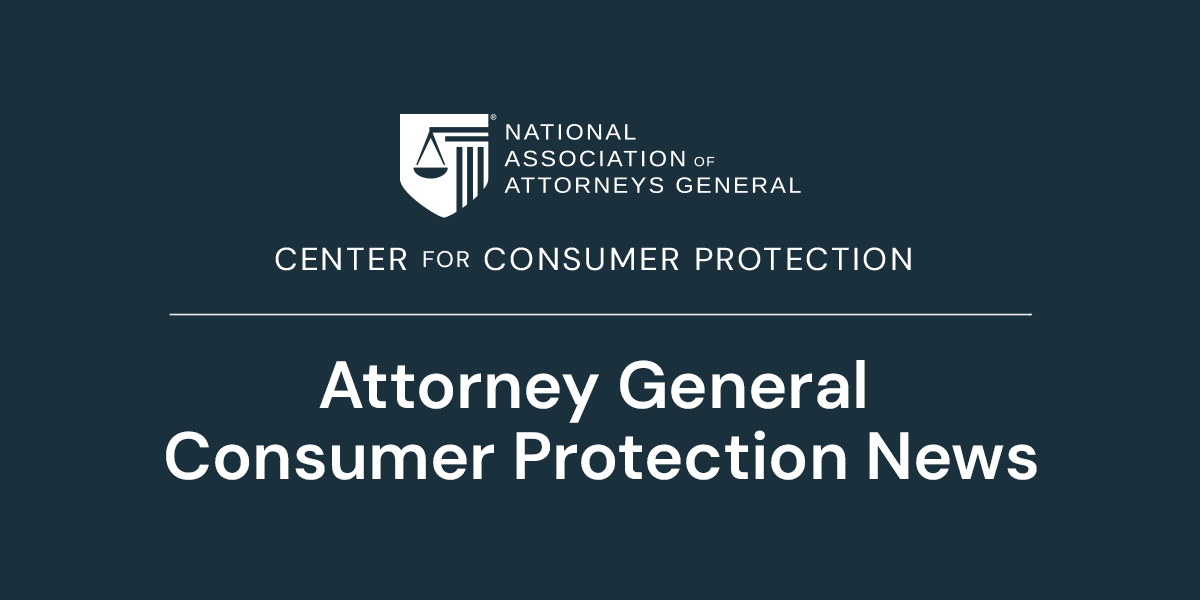Multistate Actions
California Attorney General Rob Bonta led a multistate coalition of attorneys general demanding a recall of the theft-prone Hyundai and Kia automobiles. In the letter to National Highway Traffic Safety Administration (NHSTA), the 18 states urged NHTSA to take immediate action by instituting a recall of the allegedly unsafe Hyundai and Kia vehicles, whose easily-bypassed ignition switches and lack of engine immobilizers make them particularly vulnerable to theft. The letter notes that a surge in thefts of these Hyundai and Kia vehicles have caused deaths and property damage and have consumed law enforcement and emergency responder resources.
Led by Illinois Attorney General Kwame Raoul and Nebraska Attorney General Mike Hilgers, sixteen attorneys general announced a national settlement with Visibly Inc. (Visibly) that resolves an investigation into deceptive marketing practices by misrepresenting the safety or effectiveness of the company’s vision tests. Visibly advertises and sells an online vision test, among other products. Under the settlement, Visibly agreed to pay the participating states $500,000 and is required to significantly alter its business practices.
Led by California Attorney General Rob Bonta, District of Columbia Attorney General Brian Schwalb, and New Jersey Attorney General Matthew Platkin, eighteen attorneys general submitted comments to the Federal Trade Commission (FTC)supporting a proposed rule that would eliminate non-compete clauses in employment contracts in most circumstances. The FTC’s proposed rule concludes that non-competes are an unfair method of competition that can depress worker wages, reduce racial and gender equality in workplaces, and create legal hurdles for employees looking to grow their careers. Currently, noncompete agreements are regulated by state law, creating uncertainty for workers who work out of state. The multistate coalition urged the FTC to clarify that the proposed rule does not preempt similar state laws that provide greater protections to workers.
Led by California Attorney General Rob Bonta, New Jersey Attorney General Matthew Platkin, and New York Attorney General Letitia James, a multistate coalition of eighteen attorneys general filed comments supporting the U.S. Department of Housing and Urban Development’s (HUD) proposed rule to strengthen fair housing protections. HUD’s proposed rule implements the federal Fair Housing Act’s Affirmatively Furthering Fair Housing mandate by promoting residential integration and increasing protections against unlawful discriminatory housing practices. This proposed rule would require public entities which receive funding to prepare Equity Plans that identify difficulties to fair housing choice and specific approaches to meet fair housing goals. The plans would be available to the public for review and input.
Led by Massachusetts Attorney General Andrea Joy Campbell and New York Attorney General Letitia James, eighteen attorneys general and the Inspector General of Washington D.C. submitted comments to the U.S. Department of Health and Human Services and the Centers for Medicare and Medicaid Services in support of a proposed rule that would require the disclosure of certain ownership, managerial, and other information regarding nursing facilities, particularly from private equity investors and real estate investment trusts. This new rule will require facilities to disclose the decision makers exercising control over nursing facilities’ operations. The coalition contends that such disclosure would improve the ability of state Medicaid Fraud Control Units to hold bad actors accountable.
A multistate sixteen coalition attorneys general submitted comments urging the FTC to strengthen its “Guides for the Use of Environmental Marketing Claims” (“Green Guides”). The Green Guides are intended to “help marketers avoid deceptive environmental claims under Section 5 of the Federal Trade Commission Act and have come to play an important role in establishing the bounds of such claims. The attorneys general called for updates to the federal Green Guides to bolster consumer protection laws against advertising that overstates environmental benefits, also known as “greenwashing.” The attorneys general requested an expansion in the scope of the Green Guides to consider how the standards for each environmental marketing claim could be clarified and strengthened to better ensure they are supported by an actual environmental benefit, rather than mere speculation. Moreover, the states urged that the Green Guides not prohibit states from enacting stronger standards.
A bipartisan group of attorneys general joined an antitrust lawsuit against Google for allegedly monopolizing digital advertising technologies. The original complaint can be found here. An new amended complaint, which was joined by Arizona, Illinois, Michigan, Minnesota, Nebraska, New Hampshire, North Carolina, Washington, and West Virginia, is found here. The lawsuit alleges that Google’s anticompetitive conduct in the online advertising marketplace has inhibited alternative technologies and thwarted their adoption by publishers and advertisers. It seeks to separate Google’s advertising platforms and to end Google’s control of online ad marketplaces.
Seven attorneys general announced a $462 million multistate settlement agreement with electronic cigarette maker, JUUL, Labs, Inc. (JUUL). In 2019 and 2020, JUUL the states sued JUUL for violating multiple state laws, including false advertising, unfair competition, and the privacy rights of minors. Under the settlement, monies received will be used to support 1) programs to educate teens about the harms of vaping, and to help them quit its use; 2) enforcement work conducted to implement the ban on flavored nicotine products; and 3) research into the health effects of the use of e-cigarettes by teens.
Individual Attorney General Actions
Arizona Attorney General Kris Mayes announced a settlement with Phoenix-area restaurants, Etta Scottsdale, LLC and Maple & Ash Scottsdale, LLC, for charging undisclosed add-on fees. This settlement resolves a suit filed by the attorney general against these two restaurants’ for failing to disclose add-on charges and additional fees. The settlement bars the companies from charging fees that are not already disclosed on the menu and secures $20,000 in civil penalties for Arizona.
Colorado Attorney General Phil Weiser announced that his office reached a settlement with lender EasyPay. According to an investigation by the attorney general’s Consumer Credit Enforcement Unit, EasyPay charged interest ranging from 29% to 199% on small-dollar loans ranging from $350 to near $5,000. The investigation found that 78% of its loans were at rates over 100% and almost one half were over 168% APR. Under the settlement, EasyPay will no longer lend in Colorado, will reduce rates on existing loans, and will cease collection on defaulted loans. EasyPay will also pay $275,000 in restitution.
Florida Attorney General Ashley Moody and the Federal Trade Commission filed a complaint against Chargebacks911 alleging the company wrongfully impeded consumers’ attempts to dispute credit card charges through the chargeback process. According to the complaint, Chargebacks911 helped disreputable businesses reject consumer credit card chargeback requests. Chargebacks911 regularly sent screenshots on behalf of client businesses to credit card companies that show that consumers agreed to the disputed charges cited in the chargeback request, however, these screenshots were not from the website where consumers made the disputed purchases.
New York Attorney General Letitia James shut down two websites that impersonated the New York State Department of State (NYSDOS) and significantly overcharged users for the services provided by NYSDOS. The websites used significant elements of the look of the official website from 2021. The agreement with Thomas Romano and his company, Steamin’ Weenie LLC, required payment of $44,387 in penalties and prevents the company from using any government iconography to deceive consumers.
Texas Attorney General Ken Paxton filed a lawsuit against Nomad Internet for allegedly selling internet access primarily to rural customers through an illegal scheme that often resulted in paying customers losing all internet access. According to the suit, Nomad acquired SIM cards from legitimate wireless internet providers, reprogrammed those SIM cards, and then repackaged the telecommunication equipment for resale. The AGO was able to obtain a temporary injunction blocking the company’s actions and freezing Nomad’s assets.
Washington Attorney General Bob Ferguson announced that his office has reached settlements totaling $35 million with fourteen chicken producers as a result of his lawsuit over price-fixing of broiler chicken products. The lawsuit was filed originally in October 2021. A trial against the remaining five chicken producers is scheduled for October 2024. The complaint alleges a widespread illegal conspiracy since at least 2008 to inflate and manipulate prices, rig contract bids, illegally exchange information and coordinate industry supply reductions to maximize profits, causing consumers to overpay by millions of dollars. Two other states, Alaska and New Mexico, filed similar antitrust cases against national chicken producers.
Wisconsin Attorney General Josh Kaul sent a letter to Federal Trade Commission Chair Lina Khan, requesting that the Commission review its clearance of the 2018 Energizer acquisition of Spectrum Brands’ global batteries and lighting segment. Energizer’s $1.9 billion acquisition of Spectrum resulted in the combination of the number one and number two battery makers in certain markets. According to the letter, Energizer holds more than 40% of the general battery market in the United States. Their market share is over 60% of the hearing aid battery market worldwide. The letter states that Energizer has already announced that it plans to increase battery prices.
Other articles in this edition include:






